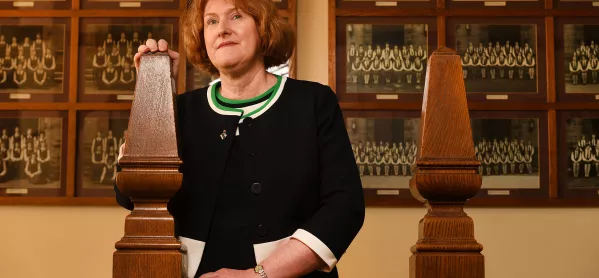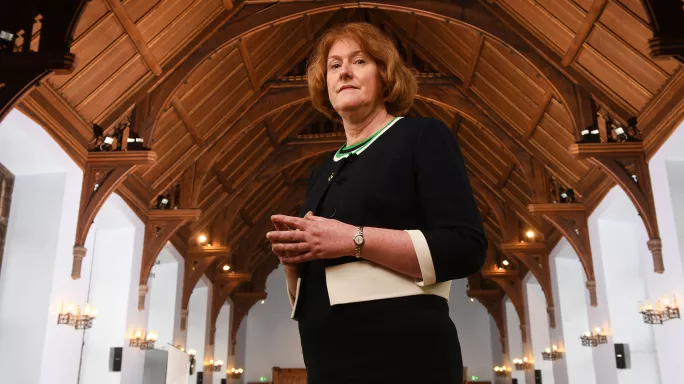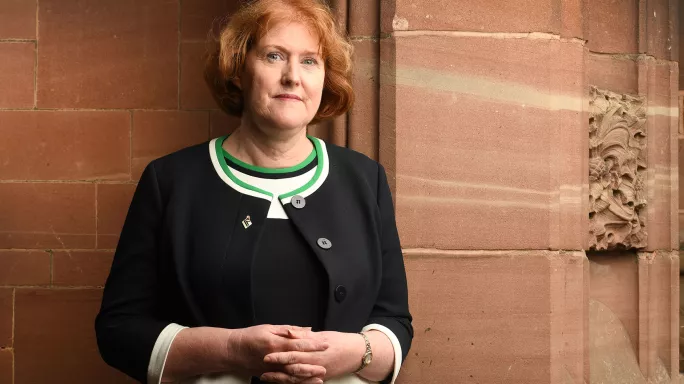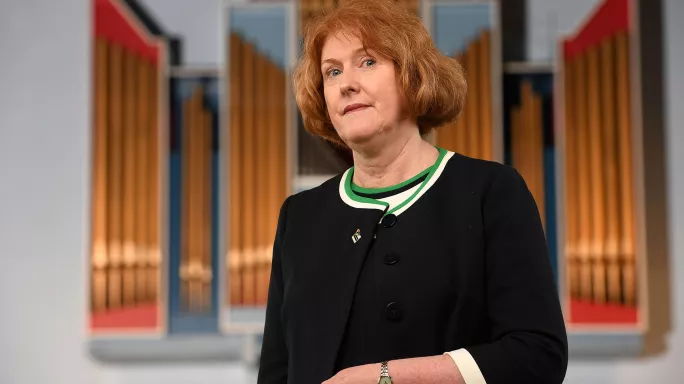- Home
- Profile: Single-sex schools let girls ‘be themselves’
Profile: Single-sex schools let girls ‘be themselves’

“I really think it’s the best job in the world because the impact you are having on so many lives is unsurpassed.”
The importance of teachers is paramount to Sue Hincks.
She is a successful independent school headteacher who has risen to become this year’s president of the Girls’ Schools Association.
But throughout her interview with Tes it seems she is more keen to talk about the teachers who helped get her there.
Quick read: GSA president defends private schools on social mobility
Tes awards: Private school innovation recognised
Opinion: Abolishing private schools’ won’t create a meritocracy
Hincks is the headteacher of the girls’ division at Bolton School, a private school in the North West of England.
Her life in education has seen her attend a grammar school and a comprehensive and work in both the state and private sector.
As she looks back over her career to date a common theme is the praise she has for former teachers and colleagues.
Last year she met up with former pupils and teachers from her school days in Bradford-upon-Avon as she and her peers celebrated turning 50.
She is glowing in her tributes for those who made an impact on her.
“Particularly Mr Knight who was my languages teacher. I can remember words he said to this day, and Mr Hull, who was my chemistry teacher, who was such a warm and inspiring person and then there was another person - Madame Baum - who was our French teacher. She was a remarkable woman. We went to visit her in a home because she wasn’t well enough to come.
“She has just recently died but I suppose those sort of relationships make you realise the importance of teachers.”
Hincks had always wanted to be a teacher and once she started she always wanted to become a head.
“I am a born teacher, it’s all I ever wanted to do. My mum’s family are all teachers. My mum’s dad was a headteacher.”
She adds: “I think the primary reason is that I just love children. Basically I am always ready to give them a second chance and I really want them to enjoy their schooling because it can be the happiest time of their lives.”

She believes her own education - both what she enjoyed and what she didn’t - has helped to shape her thinking as a teacher and the direction of her career.
Hincks spent a year as a pupil at Fitzmaurice Grammar School in Bradford-upon-Avon before it merged with a secondary modern to become a new comprehensive, St Laurence School.
“That experience of being in a grammar school that I loved, then moving to a comprehensive, where there were some excellent teachers but in an environment which I thought was quite difficult, probably shaped my thinking.
‘I believe schools should be small’
“I believe schools should be small. And this was a bit impersonal and with probably some relationships with children that could have been warmer because they threw two schools together.
“This probably shaped my thinking. I thought, ‘I don’t want school to be like this. I want it to be like it was before.’”
After graduating from Oxford University she studied for her PGCE there and then began her career as a languages teacher at the King’s School in Peterborough - a state-funded Church of England school.
After missing out on a promotion there her headteacher suggested she might apply for a job at his old school - the prestigious independent school, Marlborough College.
“I had never contemplated the independent sector before. I went for an interview at Marlborough College and I couldn’t believe what a school like that could offer in terms of resources. I had never seen anything like it.”
The move to Marlborough has led to the majority of her working life being spent in private schools. After seven years and several promotions she then moved to Gresham’s School in Norfolk and from there to King’s School, Worcester. In 2011, she earned her first headship at the girls’ division of Bolton School.

Now she speaks for the sector as the president of the Girls’ Schools Association.
‘We don’t only serve an elite’
One of the main points she is keen to make is that independent schools should not be seen as being run for the elite.
And she has pledged to make improving the prospects for disadvantaged pupils a key focus of her year as president of the body, which represents all-girls independent schools.
At Bolton School, one in five pupils received a bursary to help pay for fees.
The school has the target of making this one in three in 10 years’ time.
Its bursaries are funded through an endowment and to achieve its target the school is now actively seeking to raise funds through alumni donations to increase this fund from £20 million to £50 million.
“The governors’ raison d’être is to make this as open as possible. We give £2.5 million away in bursaries and a large percentage are 100 per cent bursaries and many more are 85 or 90 per cent bursaries, which are still life changing.”
Hincks said with this approach she was confident the school “does more to promote social mobility than many state schools”.
She says Bolton School also aims to be affordable for fee-paying parents.
“As well as supporting children from socio-economic backgrounds which means that a bursary is the only means they can get here, we also do want to help hard pressed middle-class families because we think there are lots of people who in the past might have chosen a school like this but been priced out of the market.
“We are still quite cheap in the North West. That’s a real difference between the North West and the South East.
“We can therefore be more accessible to squeezed middle than some other schools. However, even so we know that if you have two children it does probably require two parents working to be able to afford this.”
As GSA president she says it is important to get the message across “that this view that we only serve an elite is not true”.
Her other main priority in both her day job and her national role is empowering girls.
Bolton School has a boys’ and girls’ division. Externally it is seen as one school but in reality it is two. With separate staff, policies and curriculum.
Hincks believes that the set up in Bolton offers the best of both worlds.
“I work very closely with the head of boys’ Phillip Britton - we get on really well. I find having the two heads is better than one because you spark off each other.”
The schools have a shared facility where boys and girls can meet socially and they also join forces in areas such as theatre productions and a debating society.

However, Hincks believes that a single-sex school is better for her pupils because it allows them to be themselves.
“You can devise a curriculum and you teach your lessons in a way that suits the gender that you are teaching. When you go around the girls division the girls are having a laugh, in a way that I think in a co-educational environment would be a little bit different.
“They are totally themselves here, they let their hair down literally and metaphorically and I think in co-ed they would be a bit more constrained. I love the fact that it is untrammelled enjoyment.”
As the president of the GSA and head of a girls’ schools that sits next to a boys’ school, Hinck has a clear perspective on the importance of equality and of empowering women.
“It irks me sometimes when people look at our two schools and think that I work for Philip. It just goes to show that there is still some latent sexism in our society.”
However, she believes today’s young people are already on their way to changing this. She is keen for girls to explore positive role models and this year has helped the GSA to produce its own woman of the year award.
“The girls in our schools have come up with a shortlist and we are now putting that list out to all of the girls in all of our schools for them to choose.” She adds in a modestly hushed voice: “I take credit for that idea.
“There are a lot of publications who can name someone as person of the year but we can tap into what girls of 18 really think.”
Former Bolton pupils complete surveys about what they have done in life after leaving education and Hincks says both the answers and the questions show how society is changing.
Opportunities for girls are increasing
“We started it in the 1950s and obviously some of the questions show the assumption of that age: what does your husband do, at what age did you stop working?
“Our assumptions have changed so much. The idea that you had a career but when you had a family gave that up has gone completely. That is pushing forward women into roles where eventually they will be at the top of their profession - and we are getting better at organising flexible working for women at certain points of their career.
“When I look at the girls going into law or medicine I can see that it is all going to change.”
As well as forging a successful career in the independent sector, Hincks has remained involved in state school education, through partnerships with local schools, as a school governor and as a trustee of an organisation providing alternative provision.
She says she understands that the challenges faced by her sector are very different from those in the state sector both in terms of funding and accountability.
But one recurring theme she mentions again and again is how she has worked at schools where staff are devoted to their school and never want to leave.
She believes one of the single biggest differences is not only the often-referred-to smaller class sizes but also the contact time.
“Our staff are on 75 per cent contact time as opposed to 90 per cent in many state schools, but you will be expected to spend your lunch hours doing clubs and teams and definitely at weekends in boarding schools. That is where the pressure is in the independent sector.
“If resources were not a problem then reducing contact time for state school teachers would be helpful.
“There are not many jobs where the expectation is that you can’t do your job within the time you have got to do it.
“I don’t think it’s unreasonable to think people might do an hour after school but it’s when you read on Twitter of people spending hours and hours and hours then we have to question what’s happening.
“I also don’t think its unreasonable for people to do prep in their holiday time. We have very long holidays but you still do need a holiday to decompress because I think when you are dealing with very challenging children you particularly need time to bring yourself down from that level of stimulus you had when trying to do get the best from those children.
“So if I was education secretary that is one thing I would do - reduce contact time. The other which would cost loads of money is make schools smaller.
“I think it’s really important that the head knows the pupils body well and when you are talking about thousands of kids you can’t.”
Hincks says she learned this lesson about the importance of relationships in her own school days and has carried it with her ever since.
CV: Sue Hincks
- Studied modern history and modern languages at Magdalen College, Oxford
- PGCE at Oxford University
- King’s School, Peterborough
- Marlborough College, Wiltshire
- Gresham’s School, Norfolk
- Senior deputy head of King’s School, Worcester
- Headteacher of Bolton School, girls’ division
- GSA president for 2019
Keep reading for just £1 per month
You've reached your limit of free articles this month. Subscribe for £1 per month for three months and get:
- Unlimited access to all Tes magazine content
- Exclusive subscriber-only stories
- Award-winning email newsletters



